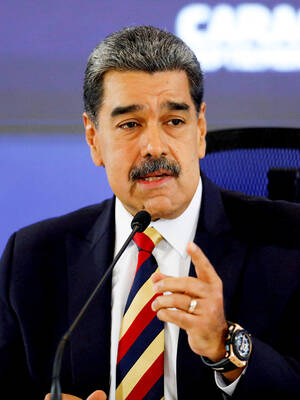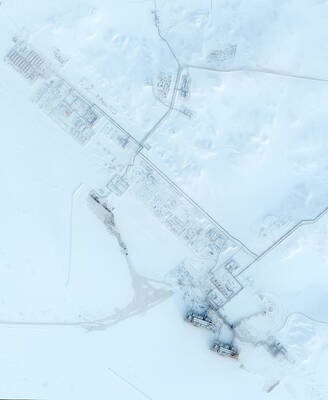Former guerrilla Hashim Thaci bids for a third term as prime minister of Kosovo yesterday, under pressure from voters angry over poverty and corruption and a war crimes investigation that threatens to ensnare his former comrades-in-arms.
Some analysts expect the closest election race since Thaci presided over Kosovo’s Western-backed secession from Serbia in 2008.
Frustration with Kosovo’s progress since independence is running high among many of its 1.8 million people, who rank among Europe’s poorest. About one-third of the workforce is unemployed. Corruption is rife.
“The result of this election is the most uncertain of any election so far in Kosovo,” political analyst Astrit Gashi said.
Fighting back, Thaci’s government raised public sector wages, pensions and social welfare benefits in March by 25 percent, and promised to do the same again every year if given a new four-year mandate. That covers 240,000 people.
“Now we have the foundations of the state, a stronger state, my partners and I will devote all our energy to implementing a new mission to develop Kosovo economically,” he told reporters last week during campaigning.
If he wins, Thaci, 46, is to come under immediate pressure from the West to heed the findings of an investigation by a special EU task force into allegations Kosovo’s guerrilla army harvested organs from Serb prisoners-of-war and sold them on the black market during a 1998 to 1999 war.
The task force is expected to issue its findings within weeks.
It was set up following an explosive 2011 report by Council of Europe rapporteur Dick Marty, which pointed the finger at Thaci and other ex-rebels, including four high-ranking members of the prime minister’s Democratic Party of Kosovo (PDK) and candidates for parliament.
Thaci has dismissed the allegations as an outrage, a bid to tarnish the Kosovo Albanian fight for freedom that eventually won NATO air support.
The West wants a court set up abroad to hear the case, fearing a fair trial in Kosovo is impossible due to witness intimidation and a legal system riddled with graft. That will require changes to the law and constitution.
“We have nothing to hide from our friends and partners,” Thaci said last week.
Thaci was one of the leaders of the Kosovo Liberation Army, which took up arms in the late 1990s to break free from the repressive rule of Serbia under then-Serbian president Slobodan Milosevic.
NATO intervened in 1999 with 78 days of air strikes against Serbia, trying to halt the massacre and mass expulsion of Kosovo Albanians by Serbian forces waging a brutal counter-insurgency fight. Kosovo became a ward of the UN in 1999.
It declared independence almost a decade later and has been recognized by more than 100 countries, but not Serbia or its big-power backer Russia, which is blocking the young state’s accession to the UN.
Kosovo’s economy is forecast to grow by at least 3 percent this year, driven by construction and cash sent home by Albanians working abroad.
Even then, the growth is insufficient to create enough jobs to absorb the thousands of Albanians entering the workforce every year in what is Europe’s youngest society.
“This government deserve nothing else but to be brought down,” opposition LDK leader Isa Mustafa told a campaign rally on Thursday.
Opinion polls are not reliable, but suggest the PDK has a slight lead over the LDK, the Alliance for the Future of Kosovo and the leftist, often anti-establishment Self-Determination party.

VENEZUELAN ACTION: Marco Rubio said that previous US interdiction efforts have not stemmed the flow of illicit drugs into the US and that ‘blowing them up’ would US President Donald Trump on Wednesday justified a lethal military strike that his administration said was carried out a day earlier against a Venezuelan gang as a necessary effort by the US to send a message to Latin American cartels. Asked why the military did not instead interdict the vessel and capture those on board, Trump said that the operation would cause drug smugglers to think twice about trying to move drugs into the US. “There was massive amounts of drugs coming into our country to kill a lot of people and everybody fully understands that,” Trump said while hosting Polish President

Japan yesterday heralded the coming-of-age of Japanese Prince Hisahito with an elaborate ceremony at the Imperial Palace, where a succession crisis is brewing. The nephew of Japanese Emperor Naruhito, Hisahito received a black silk-and-lacquer crown at the ceremony, which marks the beginning of his royal adult life. “Thank you very much for bestowing the crown today at the coming-of-age ceremony,” Hisahito said. “I will fulfill my duties, being aware of my responsibilities as an adult member of the imperial family.” Although the emperor has a daughter — Princess Aiko — the 23-year-old has been sidelined by the royal family’s male-only

A French couple kept Louise, a playful black panther, in an apartment in northern France, triggering panic when she was spotted roaming nearby rooftops. The pair were were handed suspended jail sentences on Thursday for illegally keeping a wild animal, despite protesting that they saw Louise as their baby. The ruling follows a September 2019 incident when the months-old feline was seen roaming a rooftop in Armentieres after slipping out of the couple’s window. Authorities captured the panther by sedating her with anesthetic darts after she entered a home. No injuries were reported during the animal’s time on the loose. The court in the

Another tanker carrying liquefied natural gas from Russia’s sanctioned Arctic LNG (liquefied natural gas) 2 project has docked in a Chinese port, ship-tracking data showed, days after Russian President Vladimir Putin met Chinese President Xi Jinping (習近平) in Beijing. The London Stock Exchange Group (LSEG) tracking data indicated the Russian Voskhod LNG tanker was anchored at an LNG terminal in the port of Tieshan in Guangxi, China. The Russian flagged tanker, with a cargo of 150,000 cubic meters of LNG, was loaded up at the Arctic LNG 2 facility in Gydan in northern Siberia on July 19, LSEG data showed.